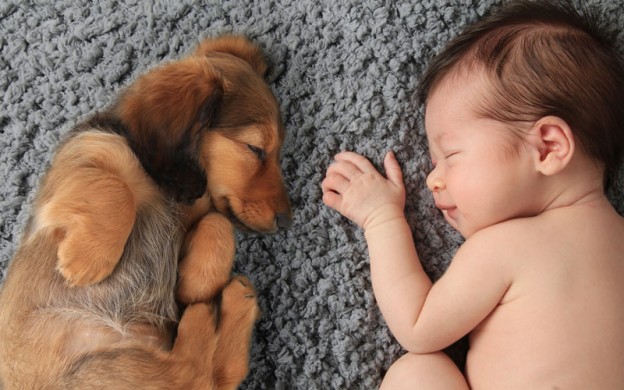
Introducing a new two-legged baby to your much-loved four-legged friend can be a real challenge. By Katie Cincotta.
What are the chances that the animal behaviourist you’ve asked to off er insights about preparing for the arrival of a baby has just had her second little one? Quite good, it seems. Melbourne’s Dr Kate Mornement, an animal behaviourist who runs Pets Behaving Badly, recently welcomed a second baby boy into the family, and was keen to impart her professional and personal opinion on making the leap into parenthood with pets.
Dr Kate says the best way to ensure a safe and smooth transition to having a tiny human around your beloved dog is preparation. “When we had our first baby in May last year and our second just last month, it gave me some additional insight into the reality of the process and really reinforced that early preparation is the key to a successful transition,” says the pet psychologist. “Having well-trained and socialised dogs to begin with certainly helped, but we’d also done the groundwork, in the months prior to the birth of our first, to ensure our dogs coped with a little human in the house.”
While science is yet to explore whether dogs recognise that a woman is pregnant, Dr Kate says it’s highly likely that dogs can detect hormonal changes via their incredible powers of scent, which have been acute enough to pinpoint cancer in humans. In my own experience, our Cavalier King Charles used to love laying her head on my growing belly, and I often wondered whether she could sense, or hear, the growing life inside me.
Of course, once all that new furniture arrives — cot, changing table, bouncer, wardrobe etc — and the parents are desperately trying to assemble them without killing each other, that’s certainly when the jig is up. Letting your dog explore all that baby paraphernalia well before the baby arrives starts to warm curious doggy minds up to the impending changes.
“Dogs will notice changes to their environment, such as the introduction of nursery furniture and other baby items. It’s important that owners begin to create a positive association, using positive-reinforcement training. Use your dogs’ favourite treats, as well as praise, to reward calm and compliant behaviour in the nursery,” Dr Kate says.
Setting up some parts of the house as no-go zones before the baby arrives can also help your dog adjust to boundaries, especially if they’re used to having the run of the house. “We installed baby gates to section off certain areas of the home,” says Dr Kate. Another important change for your dog will be adjusting to the sounds of a newborn, which could be a shock to the system at first. “We played sounds of babies crying and cooing, pairing them with treats to allow our dogs to get used to the sounds and not be fearful or anxious,” explains Dr Kate.
Here are just a few things that can make life with your dog a bit easier - see them now on our DOGSLife Directory




